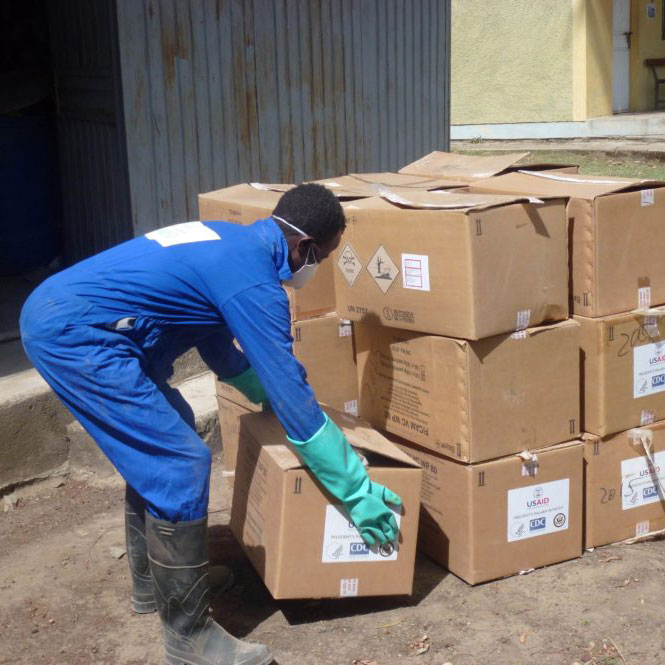
The PMI AIRS Project arranged for the transfer of nearly 13,000 bendiocarb sachets to a district that was able to use the insecticide in this year’s spray campaign. Photo: AIRS Ethiopia
Improved Stock Management Reduces Insecticide Waste
Over the past several decades Ethiopia has used a variety of insecticides for indoor residual spraying (IRS) to prevent the spread of malaria, including DDT, malathion, deltamethrin, bendiocarb, propoxur, and pirimiphos-methyl. Changes in insecticides used for IRS and poor quantification have often resulted in excessive stock of expired insecticides. In 2015–2016, the U.S. President’s Malaria Initiative (PMI) Africa Indoor Residual Spraying (AIRS) Project supported the disposal of some 115 tons of DDT in PMI-supported districts to ensure the safety of the population and the environment.
Disposal of insecticide, particularly DDT, is complex, expensive and challenging. To reduce the risk of having to dispose of expired insecticide, the PMI AIRS Project ensures that the quantities and expiration dates of insecticides to be used in 36 IRS project districts are documented at all district stores and at the central warehouse. This allows the project to use the insecticide stock prior to the expiration date. Any excess stock in one district is moved to districts in need or exchanged for use in the government’s spray program.
Specifically, the project is ensuring:
- stakeholders adhere to the principle of “First Expiry, First Out” by monitoring insecticide use;
- all personnel involved in IRS management at the district level are adequately trained on stock management;
- all stakeholders, including District Malaria Focal Persons, work together to ensure success of the insecticide monitoring and exchange between districts;
- insecticide quantification and subsequent procurement considers target structures and insecticide utilization rate with only a limited quantity of buffer supplies; and
- environmental compliance checklists require verification of expiry dates during storekeeper performance evaluation.
The approach requires close collaboration with government partners and thorough follow-up by the PMI AIRS Project. By following these procedures, the project has successfully ensured that there is no obsolete insecticide accumulation in PMI-supported districts.
The project ensured that some 252,591 sachets of bendiocarb were used before the expiration date. Forecasts were done at the beginning of the spray season and surplus stock was given to graduated PMI districts in exchange for fresh stock procured by the Ministry of Health with a January 2017 expiration date. The project monitored use of the insecticide in the graduated districts to ensure that the exchanged stock was fully used. To ensure adherence to best management practices the project also provided training to respective district supervisors on safe use and overall environmental compliance procedures.
This story was taken from www.africairs.net.
